
The Technical Assistance service offered by the LEDS LAC Platform, to the governments of the Latin American and Caribbean region, aims to provide technical support in the implementation and/or acceleration of its strategies mitigation and adaptation to climate change for short periods of up to a maximum of 6 months.




The Colombian Ministry of Mines and Energy (MinEnergía) under the Biogas NAMA Technical Committee led by the Ministry of Environment and Sustainable Development with the participation of the Ministry of Agriculture and Rural Development and the Ministry of Housing, Cities and Territory, had initiated during 2020 the process of formulating a Nationally Appropriate Mitigation Action (NAMA) and identified as a first step for the development of the same the need to develop a roadmap for the Biogas NAMA as a step prior to the formulation of the NAMA. The objective of the Biogas NAMA will be to promote the production of biogas and biomethane from undisputed residual agricultural biomass, the organic fraction of municipal solid waste and sludge from Wastewater Treatment Plants as a complementary and sustainable energy source to contribute to the achievement of Colombia's NDCs.
The objective of this assistance is to develop a roadmap for the Biogas NAMA and to map the municipalities suitable for the implementation of biogas pilot projects.
Based on the roadmap, the Biogas NAMA will be finalized, which will take into account the lessons learned from the different initiatives that have been developed in the country in this area and will establish a policy framework to integrate and expand efforts.

In order to dramatically increase ambition and effectively contribute to the Nationally Determined Contributions (NDCs) as set out in the Paris Agreement and the Sustainable Development Goals (SDGs) of the 2030 Agenda for Sustainable Development, a new holistic approach to low emissions, carbon-resilient development is needed. In addition, with the impact of COVID-19 on the world, governments and citizens around the world are making decisions whose impacts will be felt for generations.
In this sense, the circular economy and resource efficiency play a key role and provide a useful framework for a more holistic approach that analyzes a country's economic system as a whole. It provides an attractive entry point for the private sector, resulting in a more resilient economy and ensuring that governments and businesses do not attempt to return to the status quo before the COVID-19 crisis.
Such is the case of Mexico who is committed to the fight against climate change and have submitted their Intended Nationally Determined Contribution (INDC) in 2015 to the UNFCCC before the Paris Agreement. Targeting private sector companies to step up their efforts with respect to the circular economy can provide an important source for improving the economic system. Circular business models, sustainable management and efficient use of natural resources specifically contribute to the achievement of the NDCs and SDGs. However, the definition and use of indicators for sustainable and efficient resource management is currently limited.
To fill a gap in this regard, technical assistance was provided to the Private Sector Studies Commission for Sustainable Development (CESPEDES) to identify circular economy business cases in different economic sectors in Mexico and replicate the circular economy tool developed for the Argentine Chapter of the World Business Council for Sustainable Development (CEADS).
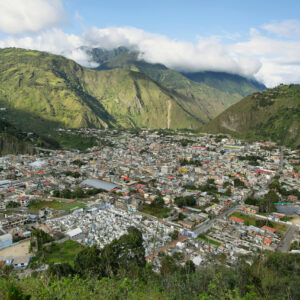
The success of the Paris Treaty, signed in 2015 depends on the actions and measures defined in the Nationally Determined Contributions (NDCs), which different parties agreed to implement in their countries. Sub-national governments can be powerful contributors to the fulfillment of the Paris Agreement. They play a fundamental and complementary role to national governments by enacting local and regional policies and strategies aimed at reducing greenhouse gas emissions and promoting more climate-resilient territories.
In order to achieve the goals of Ecuador's NDCs, the national government is requesting provincial governments to: maintain records of local climate initiatives as well as measures that have been planned or are under development; promote or strengthen the creation of networks in order to exchange information and experiences; develop dissemination and education programs on climate change issues; incorporate climate change criteria in development and land use plans and other provincial planning instruments; and subsequently evaluate climate measures already implemented, through coordinated work with the National Environmental Authority and sectoral entities, as a way of more efficient interaction, which provides for complementarity and avoids duplication of efforts.
Elaboration of a methodological document to guide Provincial Governments of Ecuador on how to incorporate Ecuador's NDCs at the subnational level in territorial planning. The same was piloted with five Provincial Governments that allowed them to understand their potential contribution to the fulfillment of national climate goals, established in Ecuador's NDCs, within the framework of the Paris Agreement.
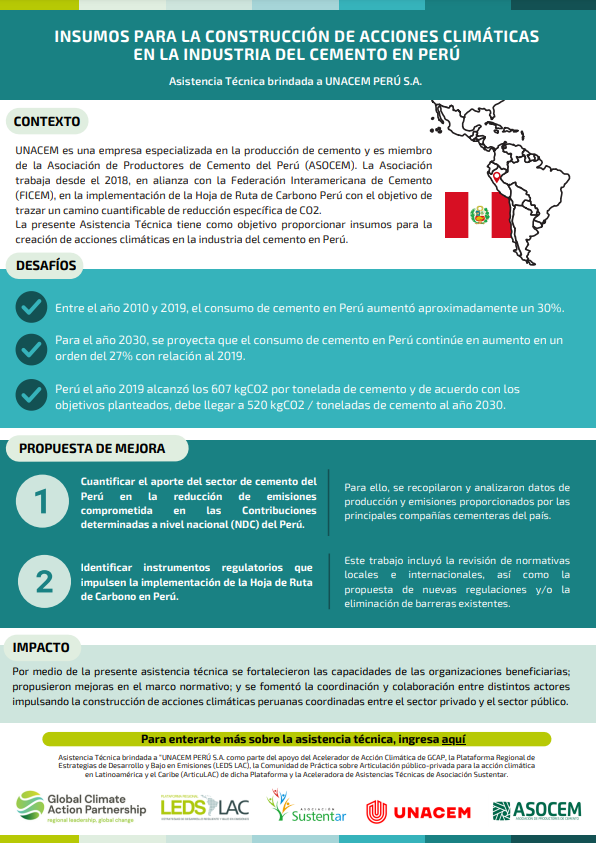
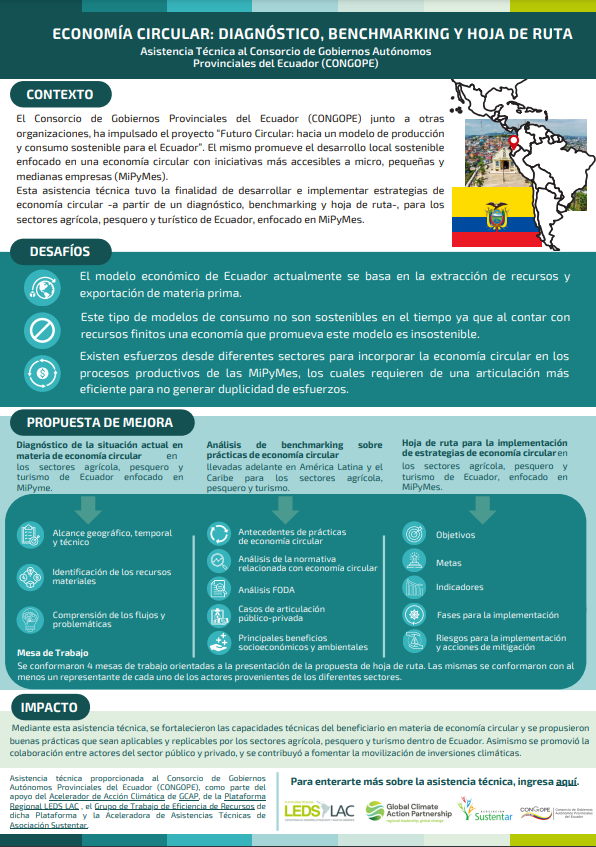
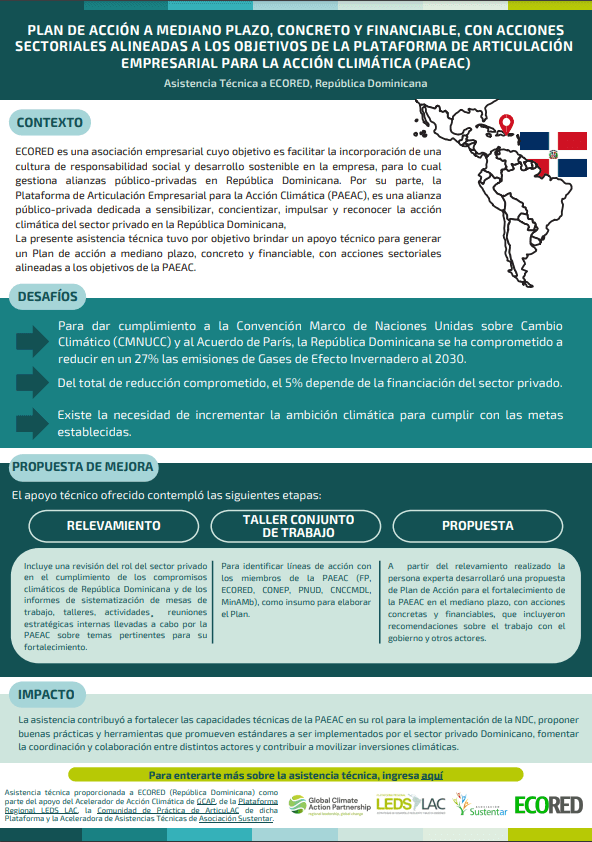
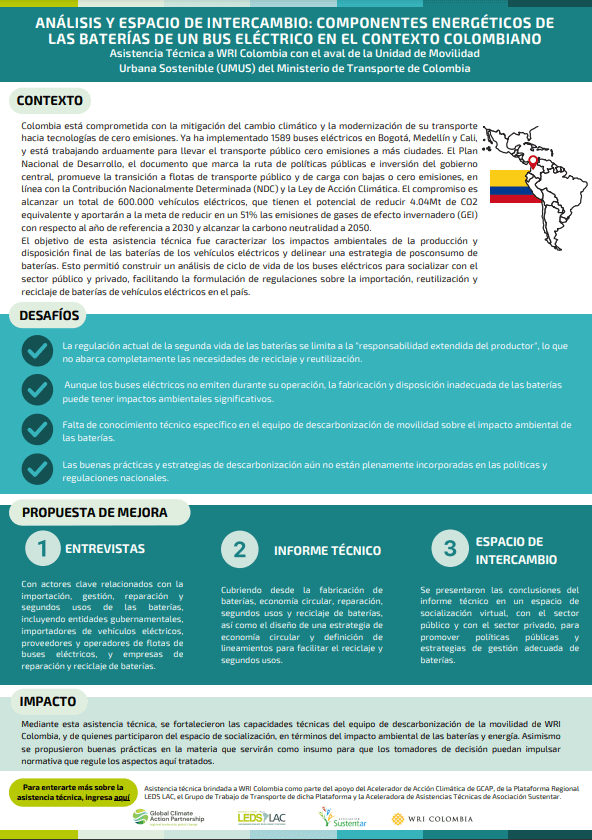
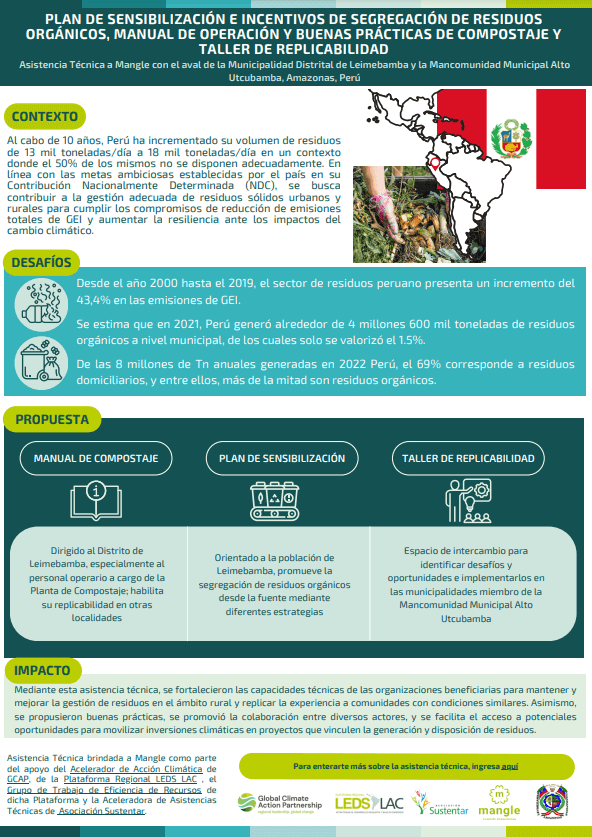
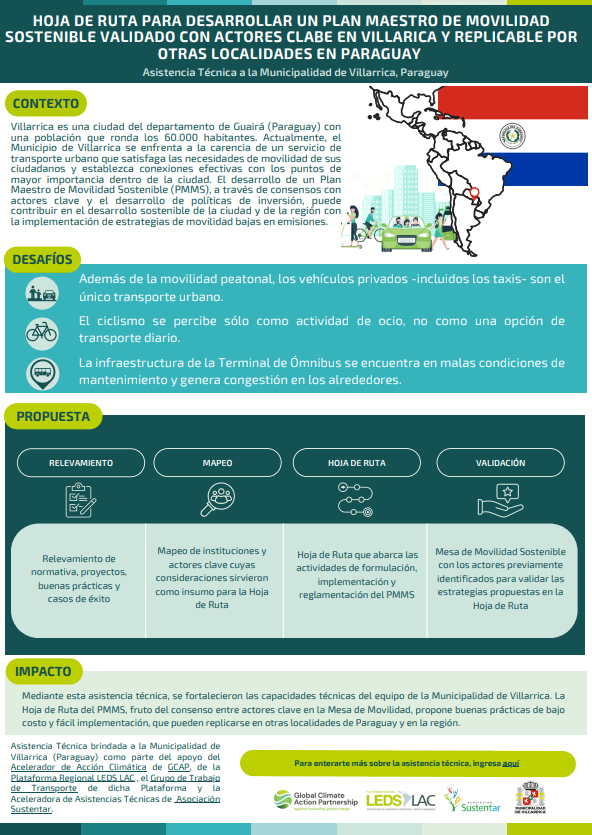
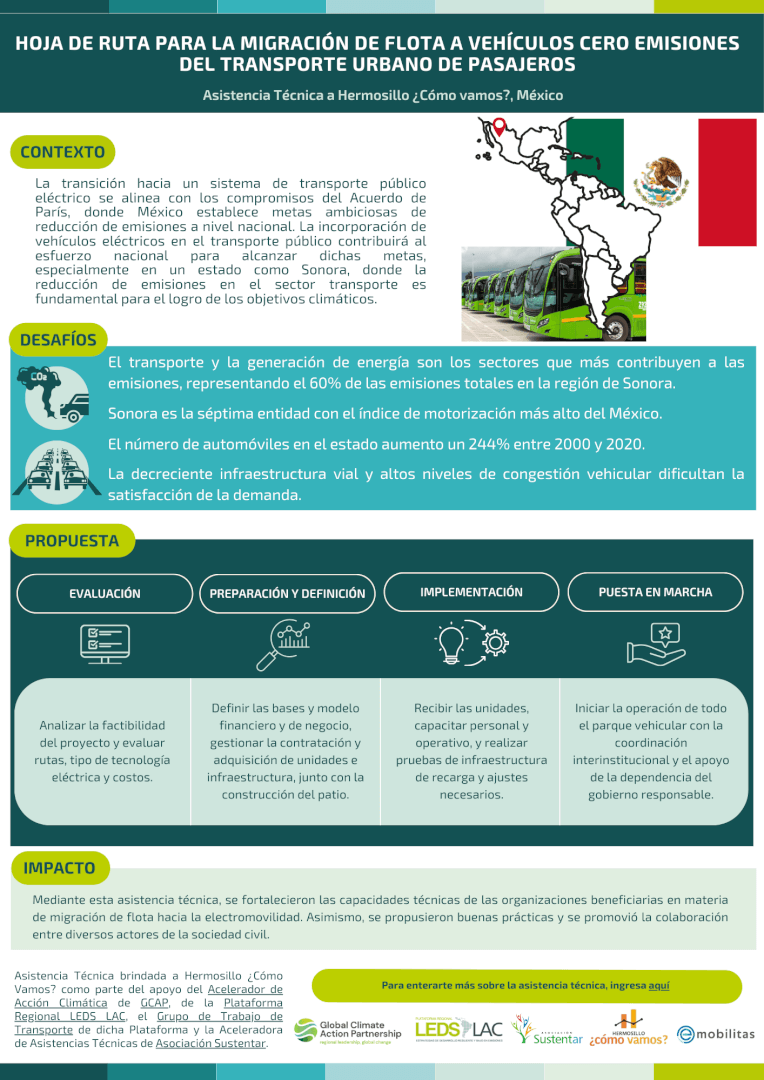
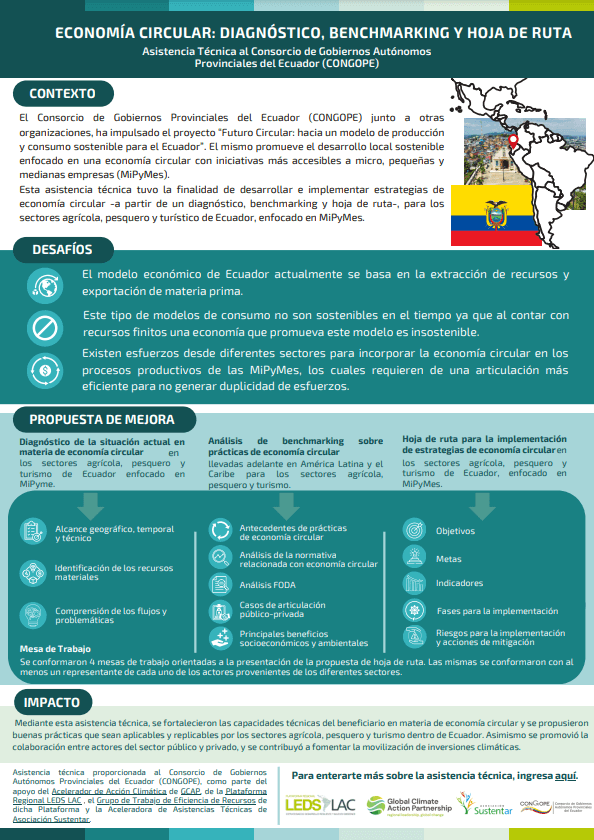
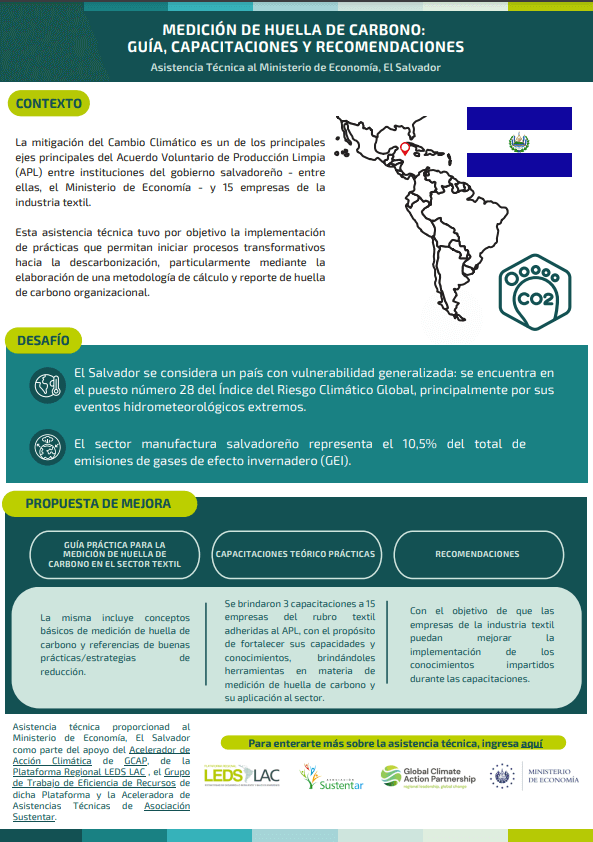
The city is developing the "Low Carbon Urban Logistics for City 30" project, with the objective of reducing GHG emissions from freight transportation. The technical assistance sought to complement the project by generating guidelines to develop a strategy for the adoption of electric vehicles for last-mile distribution.
Technical assistance to the Urban Transport Authority of the cities of Lima and Callao (ATU) in Peru for the preparation of a Roadmap for an electric mobility policy that seeks to achieve the objectives in terms of emissions reduction in the transport sector of these localities. As a result, the document presents the activities that ATU should promote, with a proposed timeline and an identification of the actors involved for the implementation of the "Electric Mobility Policy" encouraging the promotion of clean alternatives.
This summary presents the main results of the technical assistance provided to Banco de la Nación Argentina (BNA), as part of the Climate Helpdesk support of the Low Emission Development Strategies Global Partnership (LEDS GP).
The city of Rosario has a high population density and 50% of its productive activity comes from retail stores. This means that many modes of mobility coexist. Efficient management of the city's mobility was a challenge.
Mexico City's Metrobús (MB) public passenger transportation system has focused its efforts on reducing its negative socio-environmental impacts, for which, among other measures, it has incorporated technologies to reduce emissions and renewed its fleet.
Mexico City, as the main urban agglomeration and capital of the country, is the political, economic and cultural core of Mexico. It is one of the most dynamic cities in the global economy and the financial center of Latin America.